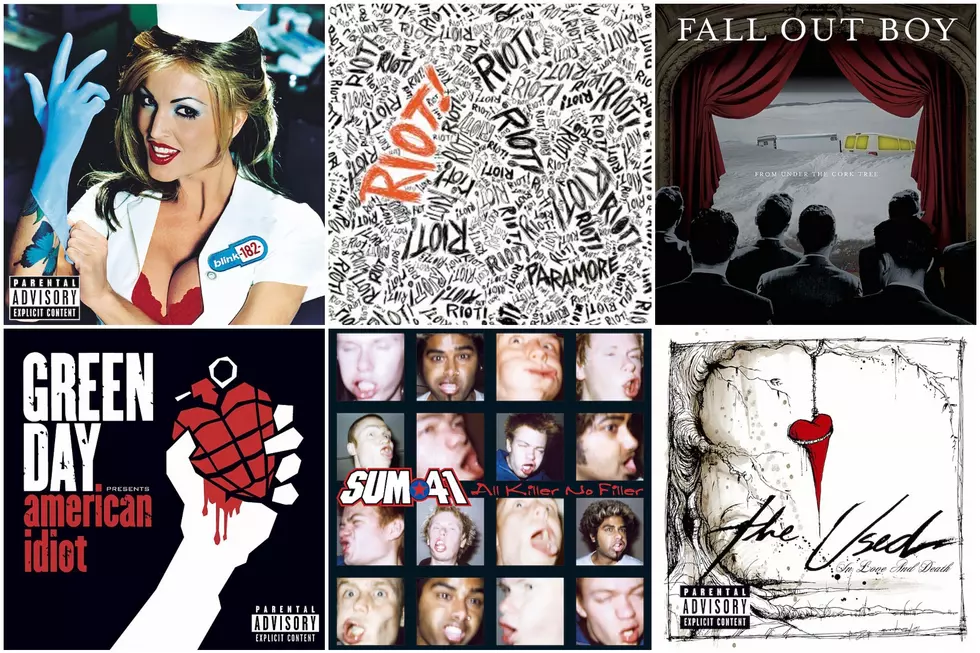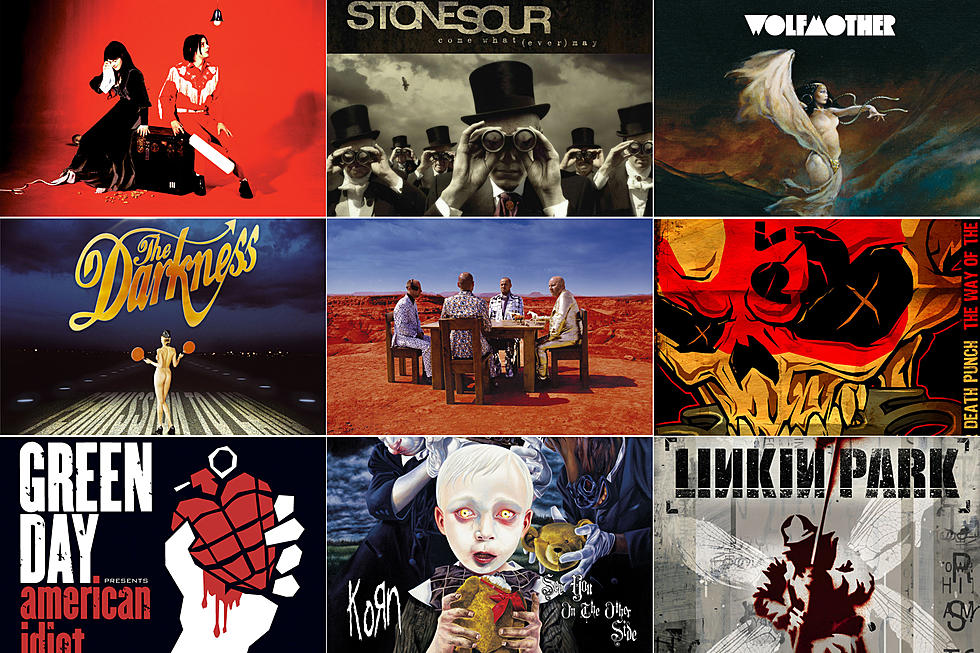
The Used’s Bert McCracken Talks New Album ‘Imaginary Enemy,’ Political Revolutions + More
Ever since the Used released their self-titled debut album in 2002, fans have been rabid to delve into the mind of singer Bert McCracken. The Used connected with their fans with such impact that McCracken unknowingly created a cult of personality around him, forcing the singer into a dimension somewhere between musician and celebrity.
The Used will soon release their sixth full-length album, 'Imaginary Enemy,' and we got a chance to speak with Bert McCracken from his current home town of Sydney, Australia. Somewhere along the way, our interview with the singer morphed into a 40-minute conversation covering subjects far beyond 'Imaginary Enemy.' We'll be bringing the full conversation to you in two parts, beginning with this one where McCracken addresses the Used's new album, becoming a public figure during the rise of social media, political revolutions + much more.
Please enjoy Part One of our journey into the mind of Bert McCracken!
‘Imaginary Enemy’ is about to come out, but you recently released your ‘The Ocean of the Sky’ EP. To you, what part does that EP play in the lineage of The Used?
I think that consciousness is becoming more acceptable in the world and not everyone is going to bow down to 'Duck Dynasty' much longer.
It’s a great step, maybe a building block. I think that consciousness is becoming more acceptable in the world and not everyone is going to bow down to 'Duck Dynasty' much longer. [Laughs] So, we’re really excited about the transition. I think knowing who we are in the world is more acceptably cool than it used to be. I don’t think people get bummed out talking about a little philosophy here and there.
Like always, I think art is just a snapshot of what’s going on in the moment behind the artist. I could only write and be true to what it’s in my heart, and that’s where I’m at. I think we try to keep things general enough to where it can be about whatever, but 'Ocean in the Sky' was kind of a different situation. There’s cool allegory, there’s some tricky semiotics. We’re taking signified and signifier and maybe turning on its head a bit.
From 'Imaginary Enemy,' you’ve released the song ‘Cry,’ which is a more straight-forward Used song. Is 'Cry' a hint of what we can expect from 'Imaginary Enemy' or does it go into experimental territory as well?
The Used has always liked to keep it wide open. I love a good catchy melody and I love… I don’t want to say pop music, because that’s taken on a whole new term nowadays, but I love a song that gets stuck in your head with a catchy chorus. It’s always been a part of my aspiration to write songs that I like to listen to. This record is just as diverse as any of the Used's records in the past. This record, I think, has the heaviest song we've ever written, which is called ‘A Song to Stifle Imperial Progression: A Work in Progress.’
This record also has a really, really lovely sentimental value and it has a lot of deep, open questions. We’re really not trying to push ideology down anyone’s throat, we're asking some serious questions that I think are important to ask.
What are those questions?
So many. Who are we? Where did we come from? What happens in the end? Then some more subtle geopolitical questions. What is the war on terror, the war on drugs and the war on poverty? Are these things a benefit to humanity or a hindrance like everything else we see? Why are Americans choosing ignorance over freedom? Why is the world suffering as much as it is? Why do big businesses run the world? There's 20 billion questions we're asking. [Laughs] Also, keeping it light, I guess this record is about personal freedom just as much as the freedom of humanity.
The first part of that answer sounds a lot like the beginning of 'Take it Away' right before the shotgun pump. Do your questions for 'Imaginary Enemy' come from the same place?
Yeah, just like Thales, the 'first philosopher,' we’ve always been interested in the bigger questions and not afraid to discuss. I think the fact that people are so fundamentally lost in their belief systems to where they can’t even discuss them with other people without fighting about it -- it’s gone too far. It’s important to discuss what we pretend to believe for the moment being and to understand that there are 7+ billion people on the Earth, so logically, if you want to really get scientific or mathematical about it, if there are 7 billion opinions in the world, how important is each individual opinion?
Sounds like some good stuff to sink your teeth into. I think a recurring theme in your music has been mixing misery with triumph and hope. Can we expect those polar opposites balanced on this new record?
I don’t think people should be afraid of admitting that they were wrong, because I’ve been wrong. I’m still wrong. I'm wrong about everything.
Yeah, it’s good to reflect on the moments that make us who we are. I guess it's easier to say than to actualize; there is no happiness without sadness. It’s almost the same thing. I guess that’s maybe deeper than I should have gone. Perspective gets confusing when we understand that our subjective perspective on anything will objectively change according to our perspective. It’s never too late to change your mind. I don’t think people should be afraid of admitting that they were wrong, because I’ve been wrong. I’m still wrong. I'm wrong about everything. Like Socrates said, ‘The more you know, the less you will know.’ That’s always the case.
You’ve always opened yourself up for everyone to see throughout the progression of your career, shining a light on your most vulnerable moments and characteristics. Is it difficult to offer yourself to the world like you’ve done for over decade now?
I think it comes from an overly selfish place. It’s therapeutic for me to vent. I think before I realize that I put myself out like that, I’m not there yet. I’m still in that therapeutic mode, but it’s worth it for the rest of the world. Everyone will have their own opinion and the internet has become a place to demonstrate your ignorance. Whatever people want to think of me is fine. People that say they don’t care what people think, it’s tough. We’re all indoctrinated into the same system. Of course we care what people think, but we should be leaders and not followers. That's where I'm coming from.
What's interesting about the Used is that you've progressed through a time beginning with almost no social media all the way to its zenith right now. How has that advance in technology altered your experience as a musician and as someone who’s in the public eye?
It’s hard to justify all the negatives and positives. It’s such a double-edged sword, technology. It’s such a huge distraction, but at the same time, it makes the world such a smaller place and it makes everything so much more accessible that it's kind of silly to talk about the negatives. For me, I don’t have any time to follow anyone. Even my family and friends. Maybe I’m just too selfish; I’m working on that. If I want to talk to my family or see pictures, I call them and they can text me pictures.
We’ve seen the benefits of Facebook with the 'Arab Spring' uprisings. It doesn’t matter what your opinion on war is, it’s been around before humans. It’s like asking, 'What's your opinion on stone?' [Laughs]
Life is worth the constant fight. It’s a tricky world we live in with social media. You can’t tell me empirically that the more followers you have on any outlet influences the type of severe fandom you might experience or the type of hardcore fan you might get. I don’t know how many followers we have on whatever, but I do see how many people come to our shows and sing along. But I also see how many people are watching the show through their iPhone and iPad.
Does that bug you?
If I let it bug me, it will. I just understand that the world is a different world. This is a poem, kind of a secret track on the record; it starts with, "What I noticed is that no one stops to notice. Pretty busy when tomorrow gets the focus."
Like, what are you taping the show for? Are you really going to watch it later? Or do you just want to prove to your friends that you were there? There might be a million reasons for it, but it's all adverse to the actual reason for going to the show -- that escape and that freedom. I feel like I’m tied to this technology in the worst way, so I try and distance myself as much as is necessary. I’m not a crazy person, though. Okay, that’s subjective. [Laughs] But I’m not going to break my phone and not do an interview because it’s through technology.
I think that our whole lives people have been trying to convince us that we can’t do anything to change the world we live in, but it’s so incredible how little effort it takes to actually change the world.
Like you were saying, the weird sickness of celebrity is a hard thing to compare to the uprising of an entire country. I guess, yeah, social media is a good thing.
[Laughs] Yeah, exactly. I’m constantly getting those Change.org petitions to sign. And it’s incredible how many of them succeed. I think that our whole lives people have been trying to convince us that we can’t do anything to change the world we live in, but it’s so incredible how little effort it takes to actually change the world.
All of this is just changing people’s ideas as well. Occupy Wall St. sputtered out and there’s no leaders. It didn’t get too involved in the labor movement, which it should have and should have propped up unions and should have gone full civil revolution like at the end of the '60s, but what it did do was raise awareness. You rarely get a person who hasn’t heard about the misappropriation or the inequality in wealth the United States and all over the world. These things are slowly helping human beings evolve.
You say '99 percent' and everyone knows what you’re talking about.
Yeah, and it's great. It’s just the beginning. Change is coming.
Stay tuned for Part 2 of our exclusive interview with Bert McCracken!
More From Loudwire









